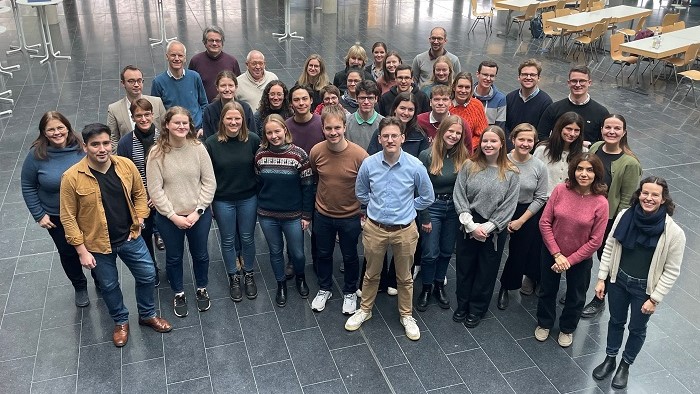Prevention, treatment & experimental research
The first day of the Winter School provided an overview of risk factors and prevention, treatment concepts and the current status of experimental stroke research on new therapy concepts. Prof Karl Georg Häusler, Senior Consultant in Neurology at the University Hospital of Würzburg (UKWs), introduced the topic of strokes, highlighted risk factors and discussed approaches to primary and secondary prevention as well as acute treatment for stroke patients.
The acute care of ischaemic stroke patients includes the time-critical application of treatment options such as thrombolysis and thrombectomy. Prof Mirko Pham, Director of the Institute of Diagnostic and Interventional Neuroradiology at the UKW, presented these two treatment milestones in stroke care, focusing in particular on the aspects of safety and efficacy.
In his lecture, Prof Michael Schuhmann, Head of the Clinical Laboratory of Neurology at the UKW and Professor of Experimental Stroke Research, demonstrated the importance of collaboration between researchers in basic and clinical research. He explained this using the example of thrombocytes, inflammatory processes and their influence on progressive infarct growth.
The interactive evening event, organised by Emily Harvey and Harry Jenkins, staff from Imperial College London, provided a unique opportunity for students, staff and professors to work together in teams and deepen their knowledge of atrial fibrillation and intracerebral bleeding using an ongoing clinical trial, the PRESTIGE-AF study. Active participation in an escape room not only promoted understanding of the clinical pictures, but also enabled practical application in identifying suitable patients for clinical trials.
Secondary prevention & stroke aftercare
The second day of the Winter School focussed on improved secondary prevention and aftercare following a stroke. Prof Charles Wolfe from King's College London gave an impressive presentation on the relationship between socioeconomic factors and stroke risk and outcomes after a stroke. He shed light on the complex relationship between socioeconomic factors and the distribution of risk factors.
Students from the Elite Graduate Program “Translational Medicine” presented topics covering the treatment and prevention of intracerebral haemorrhage, the treatment and prevention of subarachnoid haemorrhage and stroke care in developing countries.
Julia Schmidt and Anna-Lena Hofmann from the Institute of Clinical Epidemiology and Biometry (ICE-B) at the University of Würzburg and the Institute of Medical Data Science (ImDS) at the University Hospital then presented the CAEHR project, which aims to optimise healthcare for patients with cardiovascular diseases by providing relevant health information in a timely manner and introducing intelligent data-driven services along the care pathway.
Anna-Lena Hofmann and Martha Schutzmeier from ICE-B presented relevant results of the structured, cross-sectoral aftercare programme (SANO). By improving patient aftercare, the SANO study was able to show positive effects with regard to the control of cardiovascular risk factors, such as smoking and hyperlipidaemia. Lena Schmidbauer then presented the follow-up study SANO EXTEND, which will investigate the long-term effects 5-6 years after the stroke.
Dr Christoph Schwarzbach, Senior Physician at the Ludwigshafen Clinic presented the challenges of stroke aftercare. It became clear that the players in this field are complex and that aftercare extends far beyond secondary prevention. Successful management requires co-operation and multidisciplinary treatment.
Another important topic in stroke aftercare is post-stroke fatigue. Prof Gillian Mead from the University of Edinburgh presented studies on this aspect. Around half of stroke patients suffer from post-stroke fatigue; in about a third of patients, it improves without specific treatment. Prof Mead presented studies on pharmacological and non-pharmacological interventions, which show some promise. Consensus recommendations from the Third Stroke Recovery and Rehabilitation Roundtable (2023) provide advice on clinical care and a roadmap for future research.
The sixth joint Winter School "Translational Medicine and Clinical Science" was thus dedicated to a broad spectrum of stroke topics, from experimental research to aftercare and secondary prevention. For the first time, it included virtual participants from the CUHAS university Mwanza, Tanzania, and featured contributions from renowned experts such as Prof Charles Wolfe from King's College London and Prof Gillian Mead from the University of Edinburgh.
Text: Dr. Steffi Jírů -Hillmann, Elite Graduate Program "Translational Medicine"


